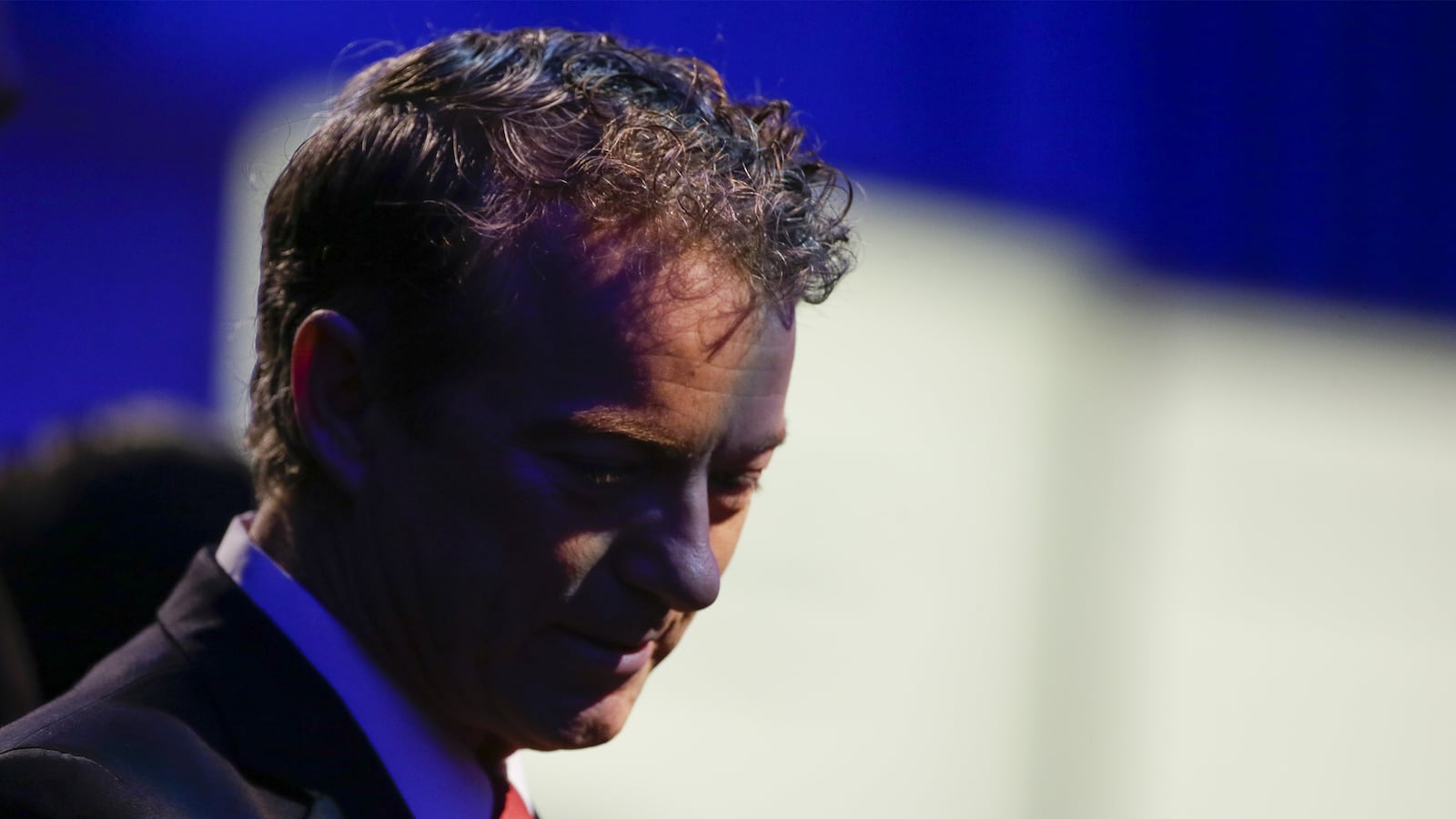With Rand Paul yanking the cord on his presidential campaign, two questions immediately arise: What explains his dramatic underperformance and what does it all mean for the “Libertarian Moment” with which he has been so closely identified? We can also toss in a third query: Where do his supporters turn now?
Recall that a year ago—even just eight months ago!—Paul wasn’t simply one contender among many but the flat-out leader in most polls of GOP contenders. It surprises no one that Mike Huckabee, Rick Santorum, George Pataki, or even Jeb Bush (out of office for nine years and bearing the least-sellable last name in politics) failed to launch. Rand Paul, meanwhile, had already achieved escape velocity and reached the political stratosphere.
The short version of what went wrong is neither complicated nor difficult to explain.
Donald Trump happened, bending virtually all the light to him like a black hole for most of the past six months or more. Trump didn’t just usher in a new tone more bracing than Aqua Velva on an open cut—he called Mexicans rapists mere minutes into his official campaign announcement, for instance, and dubbed competitors “weak” and “low-energy” to their faces—but a different set of concerns, too. Despite no indications that even Republicans were overly concerned with these things, the 2016 election suddenly was all about immigration and killing terrorists’ families. The economy, government spending, and serious foreign policy discussions were pushed to the background.
That didn’t help Paul, who drafted detailed, five-year balanced budgets from the moment he showed up in Washington, and was responsible for reintroducing non-interventionism back into the Republican lexicon. His campaign was lackluster at times or, even worse, a conservative repudiation of the “libertarian-ish” tendencies that had earned him sobriquets such as “the most interesting man in the Senate” and “the most interesting man in politics.”
The guy whose 13-hour filibuster forced President Obama to promise not to drone-kill American citizens drinking coffee at Starbucks and who said the GOP needed to be “white, we need to be brown, we need to be black, we need to be with tattoos, without tattoos, with pony tails, without pony tails, with beards, without” rarely hesitated to jump on the anti-Planned Parenthood and anti-Syrian refugee bandwagons along with all the other GOP candidates.
As my Reason colleague Elizabeth Nolan Brown hypothesizes, both Donald Trump and Bernie Sanders have been doing exceptionally well among millennials because they are viewed as uncompromising ideologues-cum-idealists. Something similar can be said about Ted Cruz and Marco Rubio, neither of whom has flirted with anything as heterodox as Paul’s libertarianism even as they have flip-flopped on “amnesty” for immigrants and other issues. Yet Paul’s willingness to flit back and forth between conservative and libertarian positions may have alienated supporters who want someone who stands for unapologetic (and in the case of Trump, Rubio, Cruz, and Sanders) often unthinking “principle.”
So what does Paul’s cashing-out mean for the “Libertarian Moment,” a “comfort with and demand for increasingly individualized and personalized options and experiences in every aspect of our lives”? Conservative Republicans who have long derided libertarians are gloating and so are liberal Democrats.
Such folks are mistaking a battle for the war, however, and short-term political fluctuations for long-term trends that will force them to adapt to a world in which people expect less from political parties and governments and force change. Confidence in virtually all aspects of government, from Congress to the president to the judiciary to the police, are below historical averages and still heading south. Party identification is at or near historic lows for both the Democrats (just 29 percent cop to the label, according to Gallup) and Republicans (26 percent), and it’s far from clear that we’ve touched bottom on that trend. There will come a time when the current system grinds to a halt.
To be sure, it’s no great boon to have the major-party guy most closely associated with libertarianism bail out before the election season’s second primary. It underscores that if the Republican Party is really serious about broadening its tent to people other than xenophobic billionaires who throw twit-fits at cable news hosts and intra-party rivals, it really has a long way to go.
Or, to put it another way, it shows that Rand Paul has a long way to go in changing his party’s culture and platform so that it becomes more serious about actually reducing the size, scope, and spending of the federal government. Talk is cheap, especially when the national debt is bigger than the economy itself.
Still, Paul is widely recognized as a leader among younger members of Congress such as Representatives Justin Amash and Thomas Massie. In the five years that he’s been in the Senate, Paul has already radically altered national conversations on topics ranging from government spending to criminal justice reform (he was the first national politician to speak out about Ferguson), to state surveillance and foreign policy.
Now that he’ll be back in the Senate full-time, it remains to be seen how quickly and how fully Paul can convince his party colleagues that, as Nate Silver has put it, “there are few libertarians, but many Americans have libertarian views,” and that the Republicans would benefit by moving in that direction. Given that politics is best understood as a “crippled, lagging indicator” and that American society has become dramatically more libertarian over the last few decades, I don’t doubt that Paul will sway most Republicans (and even some Democrats) over time—or that it will come long after all other aspects of our lives have become more personalized and decentralized for years.
There remains one final question: Where do Paul supporters go now?
Trump has no realistic shot at picking up Paul’s votes, given his lack of interest in or adherence to any set of unifying principles. Whatever happens, Rubio has already revealed himself as an apple-polisher, more eager to sit behind the desk than get the job done. His tax plan is the worst sort of social engineering via the tax code and he’s easily the most unreconstructed interventionist among the top GOP candidates.
That leaves Ted Cruz, who is nobody’s idea of a libertarian but who at least makes head fakes toward some limits on political power. Corie W. Stephens of Rare notes that Cruz has already apparently picked up one major Paul backer less than a day after the senator’s withdrawal.
So it may well be Cruz who picks up the marbles. Or it might be that much of Paul’s support simply goes into hibernation, waiting not just for one more candidate who pats them on the head and whispers stray Ludwig von Mises quotes, but actually lays out exactly how she is going to create a new operating system for a country that is both financially and ideologically broke.






